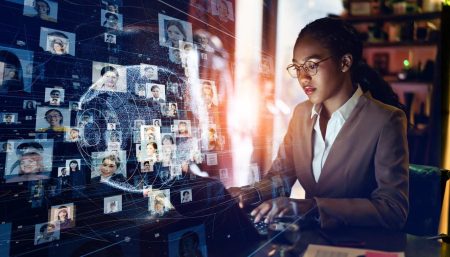Digital cities are using artificial intelligence (AI) and machine learning (ML) at the edge to deliver quality-of-life benefits everyone can enjoy: Fewer traffic snarls and less pollution
Chicago drivers spend an average of 104 hours every year in their cars — that’s more than four days of their lives spent sitting in traffic.1 As urban planning and development continuously evolve, including transportation and mobility, city governments face a multitude of ongoing challenges in their approach.
With 56% of the world’s population — nearly four and a half billion people — living in cities today, that’s a lot of people trying to get from one place to the next. And that figure is expected to jump to nearly 70% of the world’s population by 2050.2 These big cities, with their large and growing populations, are facing increasingly complex issues just helping people get where they need to go.
Many are looking for better ways to deliver meaningful citizen services, more efficiently, to make the most of limited infrastructure and resources. That’s why cities around the world right now are making strategic investments in technology with the goal of becoming a digital city.
Digital cities use innovative technologies to improve quality of life for residents, increase government efficiency, forward sustainability and be ready for what comes next. Urban transportation and mobility solutions are at the top of the list, because decreasing the time people sit in traffic significantly impacts quality of life for many citizens every day. But it does more than that. It also reduces the amount of time cars spend idling at traffic lights, reducing greenhouse emissions to help cities reach important sustainability goals.
The vision: Dynamic harmonization of city traffic
Imagine a city where you could get from your home to any point in the city in five minutes or less. As you drive down the street, every light turns green just as you come to it, and traffic flows seamlessly throughout the city in a perfectly orchestrated dance, at all hours of the day and night.
By integrating simulation tools, intelligent traffic management systems, automated violation detection systems, automated traffic data collection and other traffic-related systems, digital cities are making this vision a reality. These integrated systems are capable of adjusting traffic patterns across an entire city in real time, responding to traffic behaviors as they happen, to dynamically harmonize traffic at city intersections.
However, these systems need powerful technology capable of running AI and ML at the edge, where the action is happening. They need to be able to ingest and aggregate data from multiple sources and process it in real time. These systems need to be intelligent and integrated, capable of talking to each other. And to support other projects and future innovations, these systems should be standardized, unified and built on open-source technologies.
Maintaining and improving quality of life in the cities of tomorrow requires a fresh approach. At Dell Technologies, our point of view is that dynamically harmonized digital cities should be built on open platforms that foster and accelerate innovation. Because technology continuously evolves, digital city platforms must be designed to continuously absorb and build on new innovations.
That’s why we’re pioneering solutions to empower cities to thrive as they evolve. From open-source software and standardized hardware to seamless scalability, predictive and preventive maintenance, data services, and cutting-edge security, we offer the tools to start building your city of tomorrow, today.
“Dynamically harmonized digital cities” may sound like a starry-eyed vision of the future. But it’s closer than you think. To learn more, watch Improving Citizens’ Lives Through Dynamically Harmonized Digital Cities or visit Dell.com/edge.
Read the full article here






